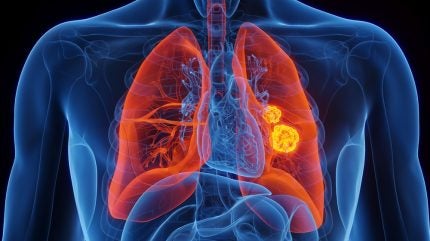
Lung cancer is the leading cause of cancer deaths globally. Non-small cell lung cancer, which originates from larger cells such as the epithelial cells lining the airways or mucus-producing cells, accounts for about 85% of these cases. Around 30% of non-small cell lung cancer patients are diagnosed at an early stage with five-year recurrence rates varying from 45% (Stage IB) to 76% (Stage III). Approximately 70% are diagnosed at advanced stages, with survival rates of 35% for locally advanced and 7% for metastatic cases.
It is essential that clinical research continues to investigate treatment for this potentially fatal disease that affects millions globally. Promising new drugs in late-stage development could provide a more personalised treatment to treat and potentially cure those suffering from non-small cell lung cancer.
The worldwide picture: global case numbers and clinical trials
There were approximately 2.4 million documented cases of lung cancer worldwide, out of which an estimated 2.1 million cases constituted Non-small cell lung cancer. The Asia-Pacific region reported the highest incidence, followed by Europe, North America, and the rest of the world. The country-wise incidence showed variations, with China, the United States, Japan, India, Germany, the United Kingdom, and France having the highest number of cases among others.
The standard treatment approach for non-small cell lung cancer includes surgery, postoperative chemotherapy, and radiation therapy, such as stereotactic ablative radiotherapy (SABR). Ongoing research efforts offer promising opportunities to improve treatment through the development of targeted therapies and immunotherapies. Biomarker testing is crucial for patients eligible for these advanced treatments, optimising treatment choices and improving outcomes, especially in advanced stages.
Since 2019, the biotech and biopharma industry initiated over 5,000 Non-small cell lung cancer trials. Asia-Pacific led in the number of clinical trials conducted, followed by North America, Europe, and the rest of the world. Mainland China led in the Asia-Pacific, while the United States was prominent in North America. Spain and France played a major role in Non-small cell lung cancer trials in Europe. Brazil and Israel contributed moderately to the rest of the world’s trials. In terms of patient recruitment trends, Asia-Pacific showed shorter recruitment durations and faster patient recruitment rates in comparison to the United States.
New treatments in the pipeline for non-small cell lung cancer
There are various marketed drugs from companies like Amgen Inc., and AstraZeneca Plc., along with other promising options in late-stage development. Marketed drugs include small molecules targeting KRAS and EGFR, such as Lumakras and Tagrisso (Osimertinib) as well as monoclonal antibodies like Mvasi (biosimilar bevacizumab). Additionally, promising phase III pipeline drugs, such as bispecific or multispecific antibodies like KN046 and ivonescimab, indicate a shift towards more targeted and personalised treatment approaches.
Non-small cell lung cancer remains a global health concern, yet research and treatment are rapidly evolving, driven by an increased understanding of the complexity of this disease. Ongoing clinical research aims to improve the management of non-small cell lung cancer through innovative therapies and emerging strategies, such as novel drug delivery methods and drug repurposing. These advancements provide personalised and effective treatment options for patients. Collaboration among researchers, healthcare providers, and pharmaceutical companies holds promise for further progress in Non-small cell lung cancer care.
Novotech, a global clinical CRO, has partnered with numerous biotech companies and completed hundreds of oncology projects, including those in immuno-oncology and advanced therapies for indications such as non-small cell lung cancer. Novotech supports over 5,000 clinical projects across all phases and bioequivalence studies. Recognised for its contributions, Novotech has received the CRO Leadership Award 2023 and has been the Asia-Pacific CRO Company of the Year since 2006.
Discover more about non-small cell lung cancer research by downloading the free comprehensive disease report below.


